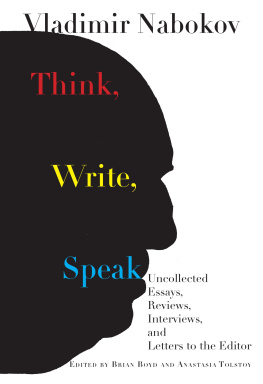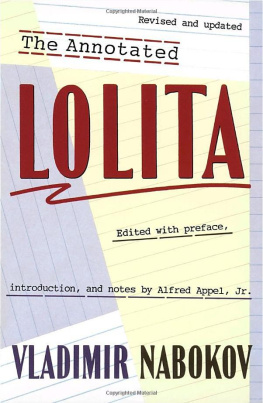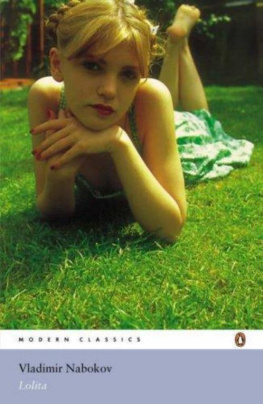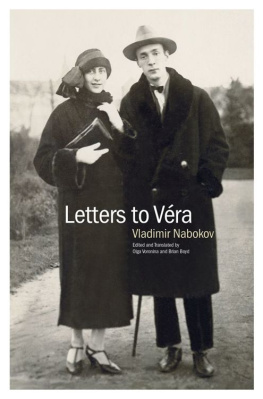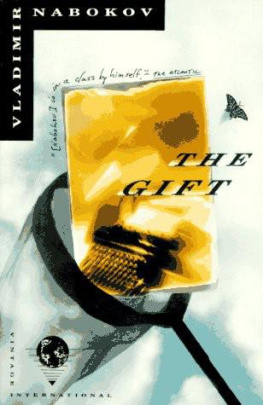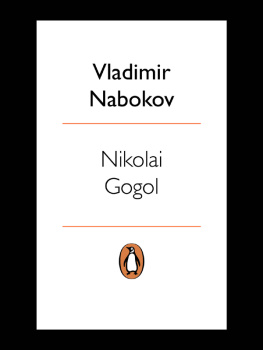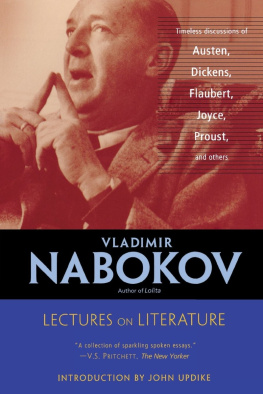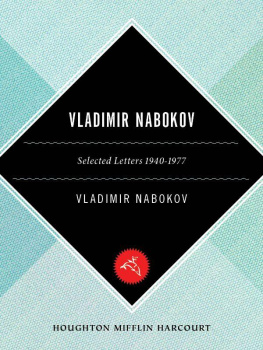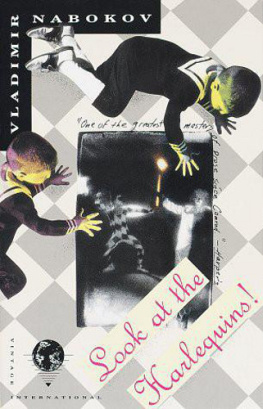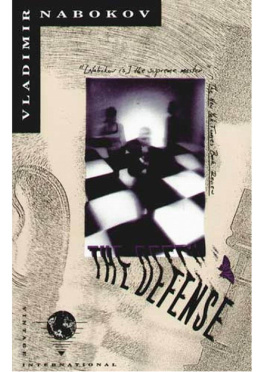Vladimir Nabokov - Lectures on Russian Literature
Here you can read online Vladimir Nabokov - Lectures on Russian Literature full text of the book (entire story) in english for free. Download pdf and epub, get meaning, cover and reviews about this ebook. genre: Detective and thriller. Description of the work, (preface) as well as reviews are available. Best literature library LitArk.com created for fans of good reading and offers a wide selection of genres:
Romance novel
Science fiction
Adventure
Detective
Science
History
Home and family
Prose
Art
Politics
Computer
Non-fiction
Religion
Business
Children
Humor
Choose a favorite category and find really read worthwhile books. Enjoy immersion in the world of imagination, feel the emotions of the characters or learn something new for yourself, make an fascinating discovery.

- Book:Lectures on Russian Literature
- Author:
- Genre:
- Rating:5 / 5
- Favourites:Add to favourites
- Your mark:
- 100
- 1
- 2
- 3
- 4
- 5
Lectures on Russian Literature: summary, description and annotation
We offer to read an annotation, description, summary or preface (depends on what the author of the book "Lectures on Russian Literature" wrote himself). If you haven't found the necessary information about the book — write in the comments, we will try to find it.
Lectures on Russian Literature — read online for free the complete book (whole text) full work
Below is the text of the book, divided by pages. System saving the place of the last page read, allows you to conveniently read the book "Lectures on Russian Literature" online for free, without having to search again every time where you left off. Put a bookmark, and you can go to the page where you finished reading at any time.
Font size:
Interval:
Bookmark:
VLADIMIR
NABOKOV
LECTURES ON
RUSSIAN
LITERATURE
EDITED, WITH AN INTRODUCTION,
BY FREDSON BOWERS
Introduction
by Fredson Bowers
According to his own account, in 1940 before launching on his academic career in America, Vladimir Nabokov fortunately took the trouble of writing one hundred lecturesabout 2,000 pageson Russian literature.... This kept me happy at Wellesley and Cornell for twenty academic years. It would seem that these lectures (each carefully timed to the usual fifty-minute American academic limit) were written between his arrival in the United States in May 1940 and his first teaching experience, a course in Russian literature in the 1941 Stanford University Summer School. In the autumn semester of 1941, Nabokov started a regular appointment at Wellesley College where he was the Russian Department in his own person and initially taught courses in language and grammar, but he soon branched out with Russian 201, a survey of Russian literature in translation. In 1948 he transferred to Cornell University as Associate Professor of Slavic Literature where he taught Literature 311-312, Masters of European Fiction, and Literature 325-326, Russian Literature in Translation.
The Russian writers represented in the present volume seem to have formed part of an occasionally shifting schedule in the Masters of European Fiction and Russian Literature in Translation courses. In the Masters course Nabokov usually taught Jane Austen, Gogol, Flaubert, Dickens, andirregularlyTurgenev; in the second semester he assigned Tolstoy, Stevenson, Kafka, Proust, and Joyce.
After the success of Lolita enabled him to leave teaching in 1958, Nabokov planned to publish a book based on his various lectures on Russian and European literature. He never began the project, although fourteen years earlier his short book on Nikolai Gogol incorporated in revised form his classroom lectures on Dead Souls and The Overcoat. At one time he planned a textbook edition of Anna Karenin , but after some work abandoned it. The present volume preserves all that has come down to us from his own manuscripts of the lectures on Russian authors.
Some differences mark Nabokovs presentation of the material from that he adopted for the European authors treated in the first volume, Lectures on Literature . In the lectures on European authors Nabokov paid no attention to biography, and he made no attempt, even in a cursory manner, to sketch in for his students an account of the authors works that were not to be read for class. The concentration was exclusively on a single book assigned for each writer. In contrast, for the Russian lectures the usual formula is to present a capsule biography followed by a summary account of the authors other works, and then to shift to a close examination of the major work to be studied. One may surmise that this standard academic approach represents Nabokovs first teaching attempts at Stanford and Wellesley. From some scattered comments he appears to have felt that the students he was to address were innocent of any knowledge of Russian literature. Hence the teaching formula customary in academia at the time may have seemed to him best suited to introduce students to strange writers and an unfamiliar civilization. By the time he gave the Masters of European Fiction course at Cornell he had developed the more individual and sophisticated approach illustrated by such lectures as those on Flaubert or Dickens or Joyce, but seems never to have altered materially his written-out Wellesley lectures for delivery at Cornell. However, since the Russian lectures covered such familiar ground for him, it is possible that at Cornell he modified his discourse with more extemporaneous comment and was less rigid in his delivery, described thus in Strong Opinions : Although, at the lectern, I evolved a subtle up and down movement of my eyes, there was never any doubt in the minds of alert students that I was reading, not speaking. Indeed, for some of his lectures on Chekhov, and especially for the lecture on Tolstoys Ivan Ilyich, reading from manuscript would have been quite impossible since no finished script exists.
One may also detect a more subtle difference than that of structure. In lecturing on the great nineteenth-century Russian writers of fiction Nabokov was completely in his element. Not only did these writers represent to him the absolute height of Russian literature (with Pushkin, of course) but they also flourished counter to the utilitarianism that he despised both in the social critics of the time and, more bitingly, in its later Soviet development. In this respect the public lecture Russian Writers, Censors, and Readers mirrors the attitude one finds in his approach. In the classroom lectures the social element in Turgenev is deplored, that in Dostoevski is ridiculed, but Gorkis works are savaged. Just as in Lectures on Literature Nabokov had emphasized that students must not read Madame Bovary as a history of bourgeois life in nineteenth-century provincial France, so his highest admiration is reserved for Chekhovs refusal to allow social commentary to interfere with his exact observation of people as he saw them. In the Gully represents, artistically, life as it is, and people as they are, without the distortion that would have followed on a concern with the social system that could produce such characters. Correspondingly, in the Tolstoy series he regrets, half smiling, that Tolstoy did not see that the beauty of the curls of dark hair on Annas tender neck was artistically more important than Lyovins (Tolstoys) views on agriculture. The emphasis on artistry in Lectures on Literature was broad and constant; nevertheless, in this Russian group it may seem to be more intense since in Nabokovs mind the principle of artistry combats not merely the prepossessions of the 1950s reader, as one feels he is arguing in the earlier volume, but alsomore important for the writersthe antagonistic and eventually triumphant utilitarian attitude of the contemporary nineteenth-century Russian critics later hardened into the dogma of statecraft by the Soviet Union.
Tolstoys world perfectly imaged Nabokovs lost homeland. The nostalgia he felt at the disappearance of this world and its people (he had met Tolstoy as a child) strengthens his typical emphasis on the artistic presentation of life in the fiction of Russias golden age, especially in the works of Gogol, Tolstoy, and Chekhov. In aesthetics, artistic is, of course, not far from aristocratic, and it is not too much to suggest that both of these powerful strains in Nabokov may lie in back of his repugnance at what he regarded as Dostoevskis false sentimentalism. They certainly feed his contempt for Gorki. Because he was lecturing on Russian literature in translation Nabokov could not discuss the importance of style in any precise detail; but it seems clear that his dislike of Gorki (apart from political considerations) was based as much on his proletarian style as on what Nabokov regarded as the ineptness of his presentation of character and situation. His lack of admiration for Dostoevskis style may also have influenced in part his generally unfavorable judgment of this writer. Wonderfully effective are the several occasions when Nabokov quotes Tolstoys Russian in the original to illustrate to his hearers the extraordinary effects from sound joined to sense.
The pedagogical stance that Nabokov adopts in these lectures does not differ materially from that found in Lectures on Literature . He knew that he was lecturing to students on what was an unfamiliar subject. He knew that he had to entice his hearers to join him in savoring the rich life and the complex people of a vanished world in literature that he hailed as Russias Renaissance. Thus he relied heavily on quotation and interpretive narrative selected to make intelligible the feelings his students should have as they read, the reactions that should follow the course of the feeling that he was attempting to direct, and the creation of an understanding of great literature based on alert and intelligent appreciation instead of on what he regarded as sterile critical theory. His whole method was to draw his students in to share his own excitement at great writing, to envelop them in a different world of reality that is all the more real for being an artistic semblance. These are, then, very personal lectures emphasizing shared experience. And, of course, because of their Russian subject they are somehow more personally felt than his hearty appreciation of Dickens, his penetration of Joyce, or even his writers empathy for Flaubert.
Next pageFont size:
Interval:
Bookmark:
Similar books «Lectures on Russian Literature»
Look at similar books to Lectures on Russian Literature. We have selected literature similar in name and meaning in the hope of providing readers with more options to find new, interesting, not yet read works.
Discussion, reviews of the book Lectures on Russian Literature and just readers' own opinions. Leave your comments, write what you think about the work, its meaning or the main characters. Specify what exactly you liked and what you didn't like, and why you think so.

